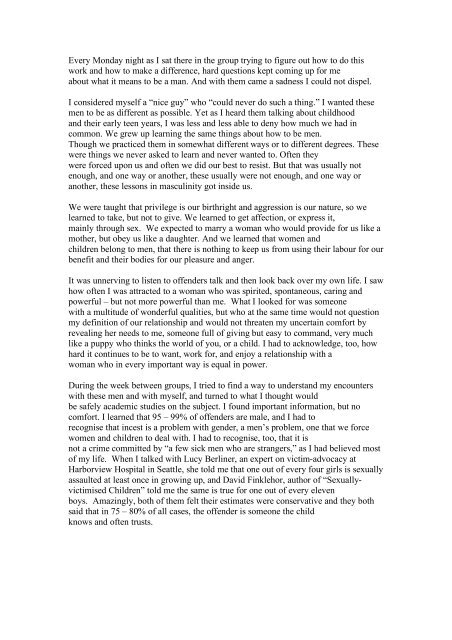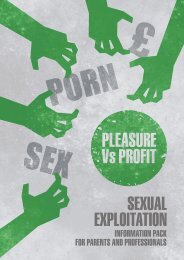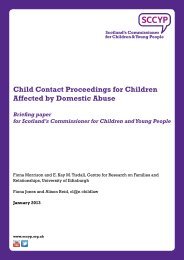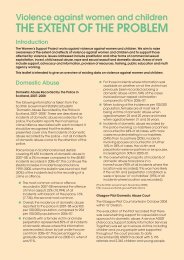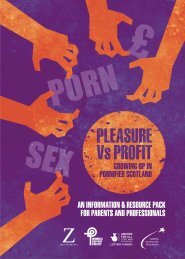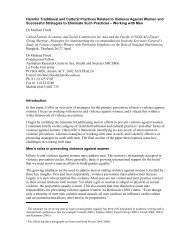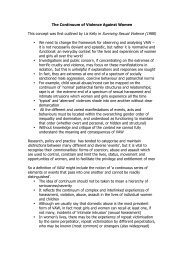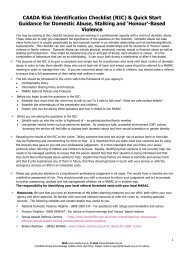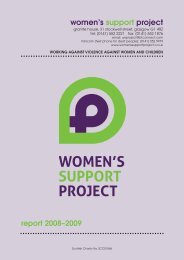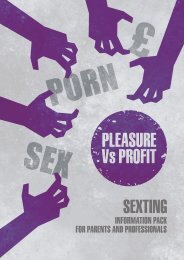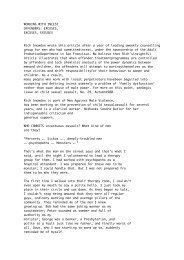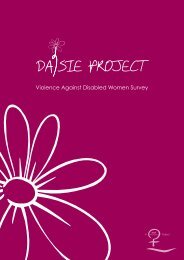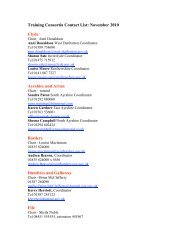WORKING WITH INCEST OFFENDERS EXCUSES, EXCUSES ...
WORKING WITH INCEST OFFENDERS EXCUSES, EXCUSES ...
WORKING WITH INCEST OFFENDERS EXCUSES, EXCUSES ...
Create successful ePaper yourself
Turn your PDF publications into a flip-book with our unique Google optimized e-Paper software.
Every Monday night as I sat there in the group trying to figure out how to do this<br />
work and how to make a difference, hard questions kept coming up for me<br />
about what it means to be a man. And with them came a sadness I could not dispel.<br />
I considered myself a “nice guy” who “could never do such a thing.” I wanted these<br />
men to be as different as possible. Yet as I heard them talking about childhood<br />
and their early teen years, I was less and less able to deny how much we had in<br />
common. We grew up learning the same things about how to be men.<br />
Though we practiced them in somewhat different ways or to different degrees. These<br />
were things we never asked to learn and never wanted to. Often they<br />
were forced upon us and often we did our best to resist. But that was usually not<br />
enough, and one way or another, these usually were not enough, and one way or<br />
another, these lessons in masculinity got inside us.<br />
We were taught that privilege is our birthright and aggression is our nature, so we<br />
learned to take, but not to give. We learned to get affection, or express it,<br />
mainly through sex. We expected to marry a woman who would provide for us like a<br />
mother, but obey us like a daughter. And we learned that women and<br />
children belong to men, that there is nothing to keep us from using their labour for our<br />
benefit and their bodies for our pleasure and anger.<br />
It was unnerving to listen to offenders talk and then look back over my own life. I saw<br />
how often I was attracted to a woman who was spirited, spontaneous, caring and<br />
powerful – but not more powerful than me. What I looked for was someone<br />
with a multitude of wonderful qualities, but who at the same time would not question<br />
my definition of our relationship and would not threaten my uncertain comfort by<br />
revealing her needs to me, someone full of giving but easy to command, very much<br />
like a puppy who thinks the world of you, or a child. I had to acknowledge, too, how<br />
hard it continues to be to want, work for, and enjoy a relationship with a<br />
woman who in every important way is equal in power.<br />
During the week between groups, I tried to find a way to understand my encounters<br />
with these men and with myself, and turned to what I thought would<br />
be safely academic studies on the subject. I found important information, but no<br />
comfort. I learned that 95 – 99% of offenders are male, and I had to<br />
recognise that incest is a problem with gender, a men’s problem, one that we force<br />
women and children to deal with. I had to recognise, too, that it is<br />
not a crime committed by “a few sick men who are strangers,” as I had believed most<br />
of my life. When I talked with Lucy Berliner, an expert on victim-advocacy at<br />
Harborview Hospital in Seattle, she told me that one out of every four girls is sexually<br />
assaulted at least once in growing up, and David Finklehor, author of “Sexuallyvictimised<br />
Children” told me the same is true for one out of every eleven<br />
boys. Amazingly, both of them felt their estimates were conservative and they both<br />
said that in 75 – 80% of all cases, the offender is someone the child<br />
knows and often trusts.


